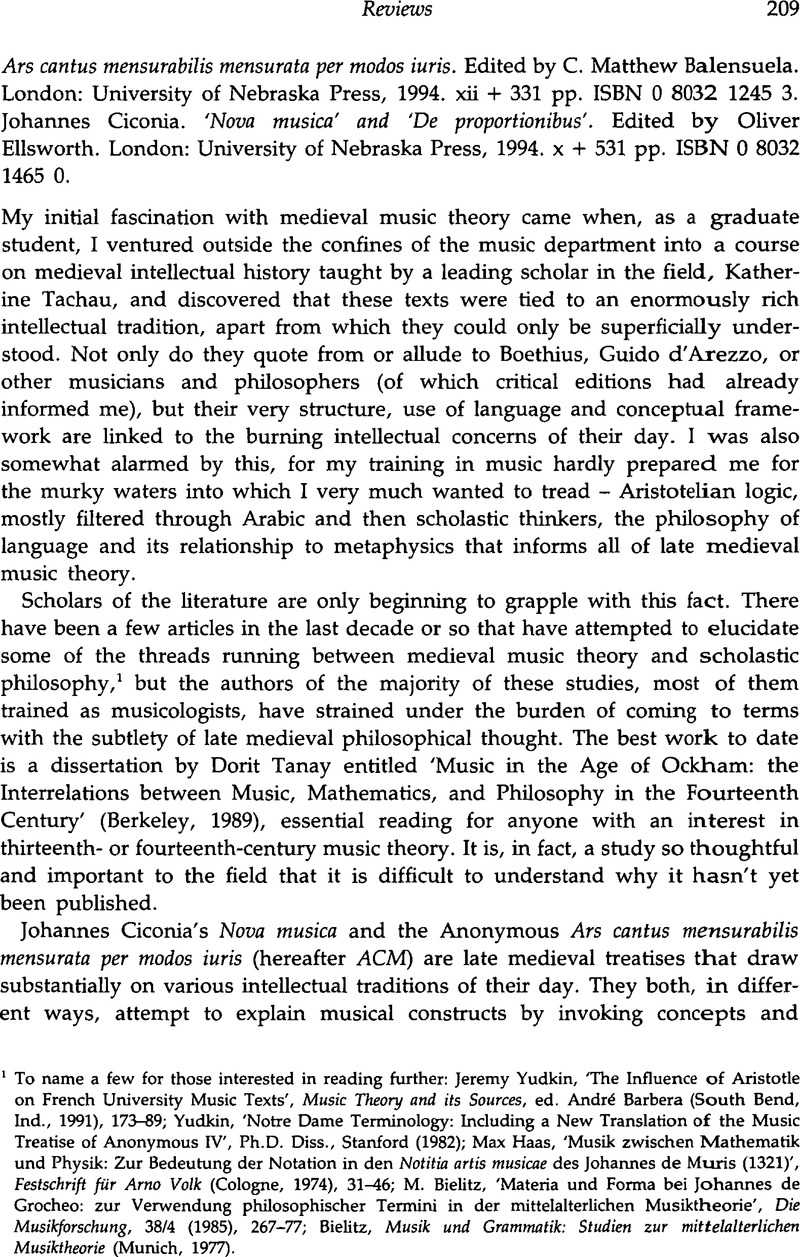No CrossRef data available.
Published online by Cambridge University Press: 12 September 2008

1 To name a few for those interested in reading further: Yudkin, Jeremy, ‘The Influence of Aristotle on French University Music Texts’, Music Theory and its Sources, ed. Barbera, André (South Bend, Ind., 1991), 173–89;Google ScholarYudkin, , ‘Notre Dame Terminology: Including a New Translation of the Music Treatise of Anonymous IV’, Ph.D. Diss., Stanford (1982);Google ScholarHaas, Max, ‘Musik zwischen Mathematik und Physik: Zur Bedeutung der Notation in den Notitia artis musicae des Johannes de Muris (1321)’, Festschrift für Arno Volk (Cologne, 1974), 31–16;Google ScholarBielitz, M., ‘Materia und Forma bei Johannes de Grocheo: zur Verwendung philosophischer Termini in der mittelalterlichen Musiktheorie’, Die Musikforschung, 38/4 (1985), 267–77;Google ScholarBielitz, , Musik und Grammatik: Studien zur mittelalterlichen Musiktheorie (Munich, 1977).Google Scholar
2 Balensuela mentions that a critical edition and translation of the Libellus by Daniel Katz is in progress, but it is my understanding that he is no longer working on this project. The treatise is extant in over fifty manuscript copies, which makes the task of producing a critical edition prohibitive. Since the treatise is so important to fourteenth-century music theory, however, it should be available to modern scholars in an edition other than Coussemaker's. An edition that is not ‘critical’ (in the sense of using all the extant sources) could be considered, using, for example, Calvin Bower's translation of Boethius as a model. Bower's work is based on a quorum of early manuscript sources (Boethius, The Fundamentals of Music, ed. and trans. Bower, Calvin (New Haven, 1990)).Google Scholar Another possibility would be a facsimile edition of some of the manuscript sources of the Libellus accompanied by a translation. See below for a discussion of this concept.
3 Definition from the Concise Dictionary of Law, ed. Martin, Elizabeth A., as quoted by Balensuela, p. 25.Google Scholar
4 Balensuela, C. Matthew, ‘Per modos iuris: Quotations of Canon and Civil Law in the Ars cantus mensurabilis mensurata per modos iuris of Anonymous V’, Meeting of the American Musicological Society, Montreal, 1993.Google Scholar
5 Kretzmann, Norman and Stump, Eleonore (eds.), The Cambridge Translations of Medieval Philosophical Texts. Volume One: Logic and the Philosophy of Language (New York, 1988), 312–13.Google Scholar
6 See Marchetto's statements in the Lucidarium (edited and translated by Herlinger, Jan W. (Chicago, 1985), 71) and the Pomerium (edited by Vecchi, Joseph, Corpus Scriptorum de musica, (1961), 36), where he indicates that the monk Syphans of Ferrara has ‘organized the book in the philosophical arguments necessary to it’.Google Scholar
7 Ciconia may have been making reference to the Liber argumentorum, a commentary on Guido's Micrologus published in van Waesberghe, Joseph Smits, Expositions in Micrologum Guidonis Aretini, Musica Medii Aevi, 1 (Amsterdam, 1957).Google Scholar
8 Hult, David, ‘Reading it Right: The Ideology of Text Editing’, The New Medievalism, ed. Brownlee, Marina S. et al. , (Baltimore, 1991), 113–30.Google Scholar
9 Ibid, 122.
10 Ibid
11 Santosuosso, Alma Colk, Paris Bibliothèque nationale fonds latin 7211: Analysis, Inventory and Text (Ottawa, 1991).Google Scholar